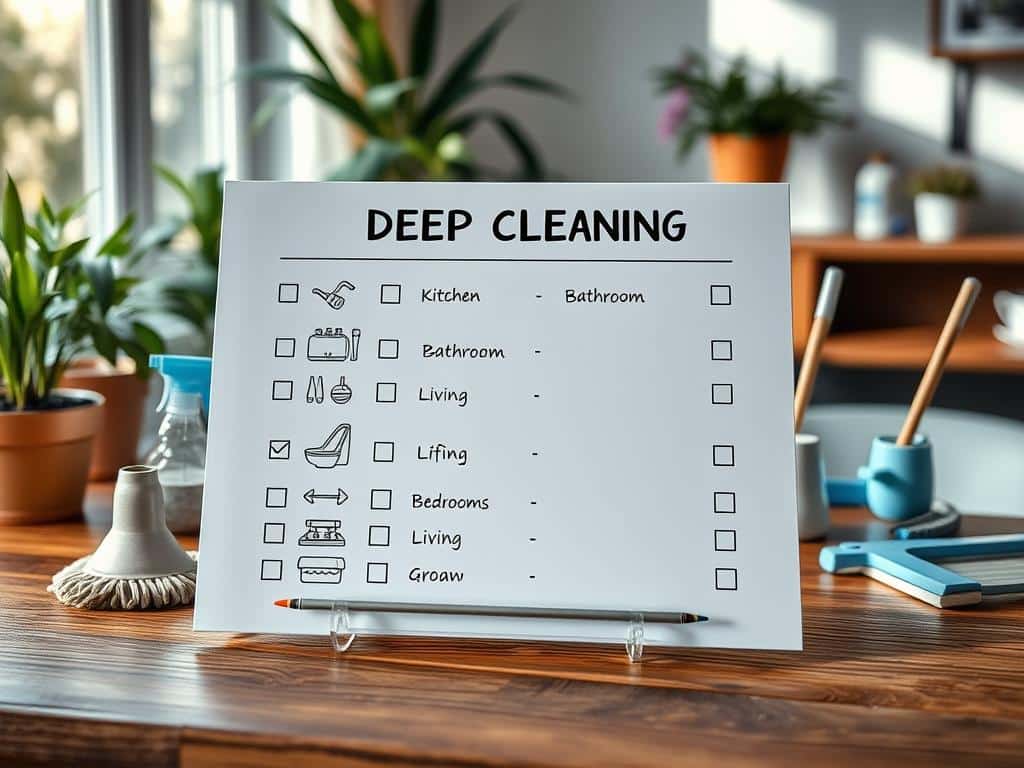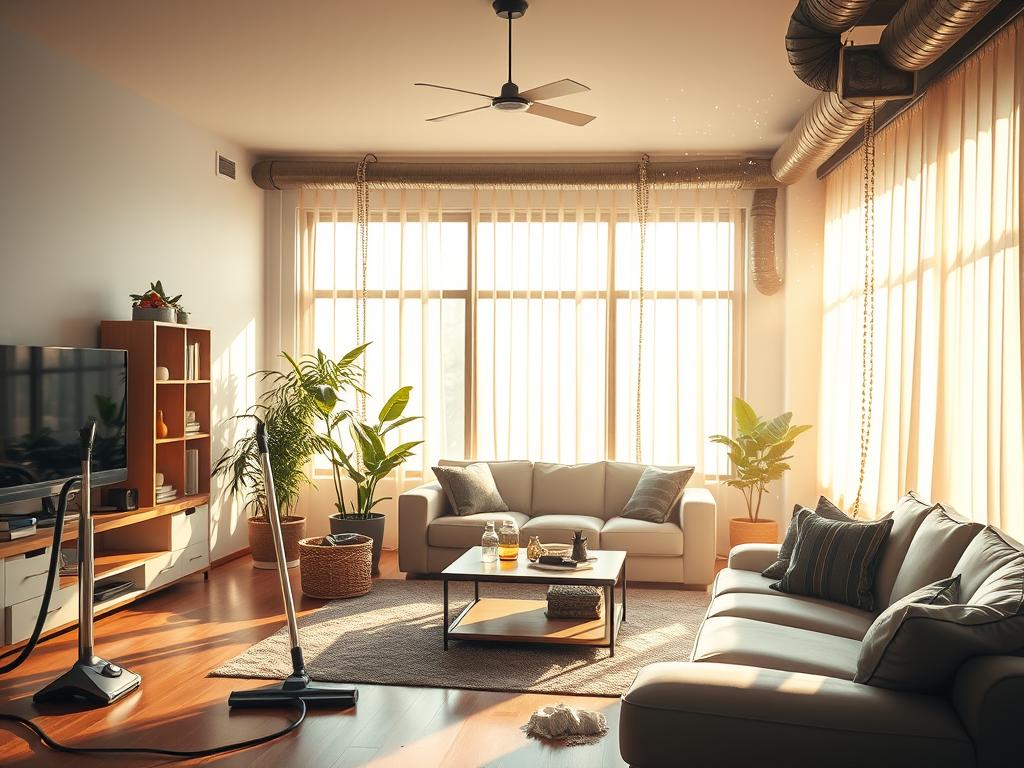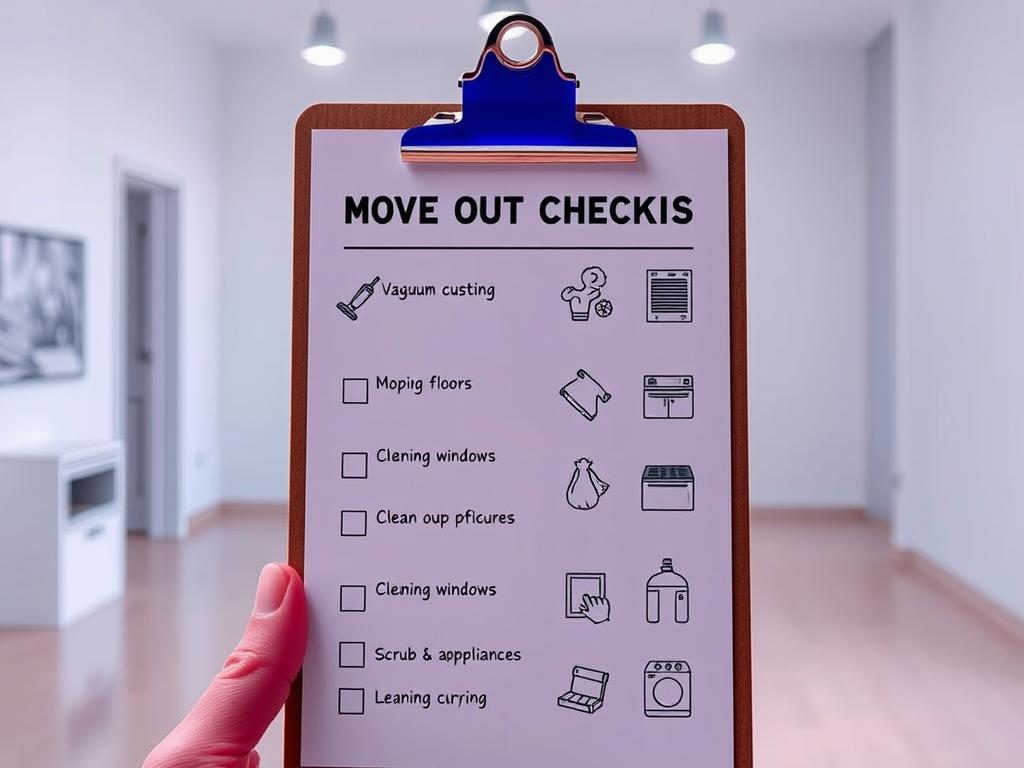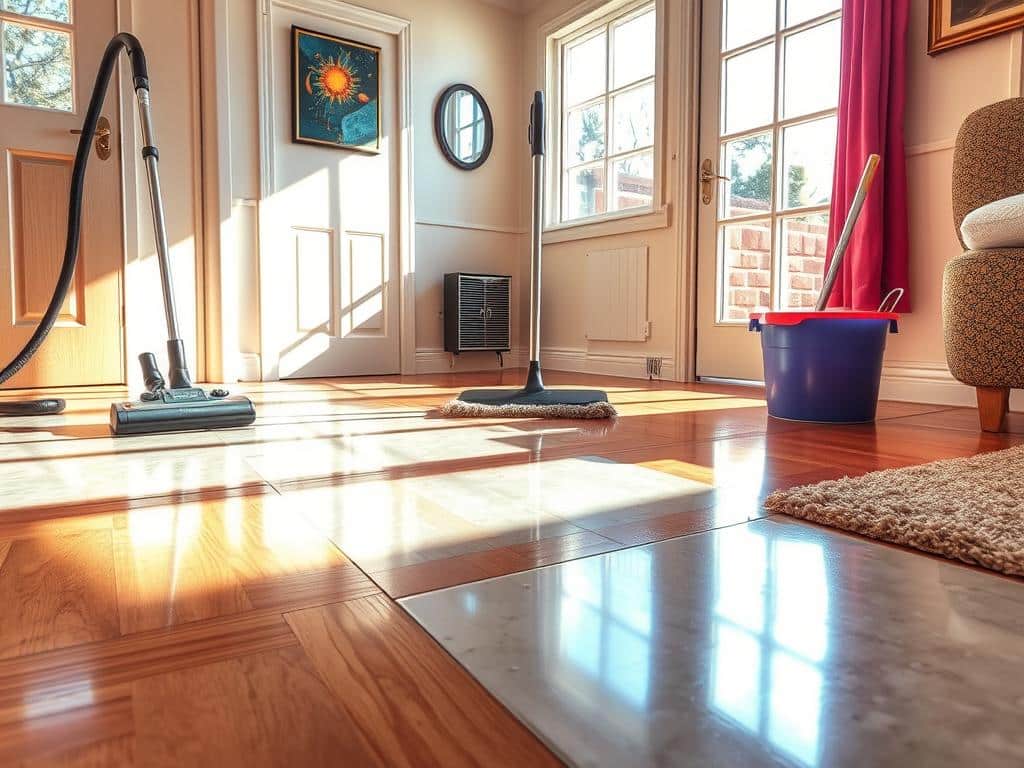
Making time for an annual deep clean is vital for a clean home. Doing it yourself or hiring help, it’s more than quick fixes. A strong plan with a checklist ensures you clean every spot.
Deep cleaning once or twice a year is usually enough. But be ready, it might take over eight hours. You’ll need the right tools like mops, a vacuum, microfiber cloths, and cleaners for different tasks.
Washing items like pillows and bedding is part of deep cleaning. You’ll also sort through clothes and other items to keep, donate, or throw away. Cleaning out spaces like closets and storage areas helps too. This organized approach gives you a clean home, just like the pros.
Deep cleaning covers many steps from tidying up to scrubbing and organizing. You’ll tackle bathrooms and kitchens, focusing on showers, mirrors, and appliances. Every corner needs attention, down to door frames and grout.
Always start cleaning from top to bottom. Getting help makes it quicker. Hit the dirtiest areas first and time each job. This plan leaves your home feeling fresh and welcoming.
Before You Begin Deep Cleaning
Start your deep cleaning with careful planning. This ensures every step is done well. These early actions set you up for success:
Clear Away the Clutter
Removing clutter is key. It can boost your productivity by up to 30%. You’ll clean surfaces and spaces easier.
Begin by clearing floors, countertops, and furniture. This makes cleaning smoother and your space look bigger and neater.
Make a Game Plan
Create a detailed deep cleaning plan. Tackle it room by room or task by task. This approach prevents burnout by spanning the work over days or weeks. It’s handy, especially for big houses.
If you’re busy or want a thorough job, think about hiring a cleaning service. They’ll cover every nook and cranny.
Take Stock of Your Supplies
Check your cleaning supplies before starting. You’ll need things like baking soda, sponges, gloves, and a vacuum with attachments. A complete supply list cuts down on cleaning time. It makes your deep clean both thorough and quick.
Good preparation and planning make deep cleaning smooth. Your home will feel entirely fresh, well-organized, and clutter-free.
Deep Cleaning the Bathroom
Cleaning your bathroom well is crucial for keeping it sanitary. Follow these tips to clean different parts of your bathroom efficiently.
Scrubbing Showers, Bathtubs, Sinks, and Toilets
First, put a multipurpose cleaner on showers, bathtubs, sinks, and toilets. Let it sit to loosen the dirt for easier cleaning. Don’t forget to clean under the sink and around the toilet base.
Wiping down these areas weekly helps stop soap scum and mildew. A daily spray for the shower also helps a lot.
Cleaning Light Fixtures, Mirrors, and Windows
Use a mix of vinegar and water to clean light fixtures, mirrors, and windows. This mix takes off grime well without strong chemicals. Also, remember to dust around window sills and light fixtures to keep the bathroom clean.

Washing Shower Curtains and Bath Mats
Shower curtains and bath mats can get moldy and hold bacteria if not cleaned properly. It’s best to machine wash cloth curtains and bath mats. Choose fabric liners over vinyl since they’re easier to clean.
Try to wash them every three months to keep them looking good.
Organizing Under Sinks and Inside Drawers
A tidy bathroom isn’t just about washing surfaces; it’s also about keeping things organized. Once a month, sort through and tidy up spaces under sinks and inside drawers. Throw away old or needless items. For extra organizing tips, check out this bathroom cleaning guide.
Well-organized storage means a cleaner space and easier maintenance.
Cleaning Grout
Cleaning grout may take time but is key for a sanitary bathroom. Grout attracts dirt and germs, especially if it’s not cleaned well. A homemade mix of vinegar and baking soda can clean it effectively.
For tough buildup, use a bleach and water mix weekly. Scrub well and rinse to keep the grout looking good and your bathroom clean.
Deep Cleaning the Kitchen
For a truly clean kitchen, you need to do more than wipe surfaces daily. A deep clean removes built-up dirt, grease, and mess, making your kitchen a safe place to cook. You’ll need some basic cleaning tools: all-purpose cleaner, disinfectant spray, soft cloths, and gloves. Use this guide to make your kitchen spotless and welcoming.
Wiping Down Cabinets
Start by cleaning the cabinets with a wet cloth or soft microfiber. If you find tough grease spots, try vinegar mixed with water. Focus on cabinet handles and the corners where dirt loves to hide. Clean thoroughly from the top down for the best hygiene.
Cleaning Kitchen Appliances
Keeping appliances clean is key to a spotless kitchen. Begin with the fridge: defrost it and wipe the shelves clean. Clean the fridge’s coils and vent to stop dirt from building up. For ovens, use baking soda paste or the self-clean feature; for greasy surfaces like stovetops, mineral oil works great. This keeps your appliances in good condition.
Organizing the Pantry
A neat pantry helps keep your kitchen clean. Start by checking all items and throwing away anything old. Organize items in clear containers or racks, grouping them by use. This saves time and makes your kitchen more orderly. A tidy pantry makes cooking less stressful.
Disinfecting the Sink
Sinks can hold harmful germs from uncooked food. Clean all parts with a strong disinfectant spray, don’t overlook handles and faucets. Scrub well to remove germs. Remember to clean your sponges every week to keep germs from spreading.
Cleaning Countertops and Shelves
Finish your deep clean with countertops and shelves. Clean them with either an all-purpose cleaner or a mix of vinegar and water. Keeping these areas tidy makes it easier to maintain cleanliness. Also, clean your walls and backsplashes to wipe away grease.
By following these steps regularly, your kitchen will stay clean and safe. It will be a pleasant place for preparing meals and eating together.
Deep Cleaning Common Areas
Keeping your common areas clean is key to a hygienic and inviting home. We’ll explore essential tasks to make your living rooms and dining areas shine. These steps ensure your communal spaces are spotless.
Vacuuming Furniture
Start by vacuuming your furniture. Focus on the hidden spots where dust and crumbs hide. Use upholstery tools to clean under cushions and seams well. This upholstery cleaning step removes hidden dirt, making your seating look and feel fresh.
Shampooing Rugs and Carpets
Rugs and carpets often trap dirt and stains. Use a good carpet cleaner for a thorough wash. Focus on areas that get a lot of foot traffic. Spot-clean tough stains, like those from pets. Cleaning carpets well not only makes your place look better but also keeps your carpets in good shape longer.
Polishing Wooden Furniture
To care for wooden furniture, first dust off surfaces and clear any mess. Then, apply wood cleaner or polish with a soft cloth. This can reduce scratches and water marks. Regular care keeps your wooden items looking good and lasting longer. Special Ops Clean Team in Phoenix highlights the importance of such care in keeping your common areas beautiful.
By doing these cleaning tasks, your common areas will be more than just clean. They’ll make your home healthier and more comfortable. Keep up with these practices to ensure your home stays welcoming and clean for your family.



